In the region Magdalena Medio, the peasant association Asociación
Campesina Valle del Río Cimitarra (ACVC) is facing repression. At the
end of September 2007, its leaders, Andrés Gil, Óscar Duque, Evaristo
Mena and Mario Martín, were detained. This detention is a major
obstacle for the ACVC to continue their struggle against the withdrawal
of the Peasant Reserve Area (ZRC) in the Cimitarra Valley, created in
December 2002 and withdrawn in 2003. The ZRC comprises over 25 thousand
peasants in a process of comprehensive development and human Rights
defence. The region is subjected to a food and sanitary blockage. It is
very urgent to urge the Colombian government to carry out the judicial
investigation against the leaders of the ACVC without depriving them
from their freedom, as established in the new Columbian legislation.
Moreover, the rights of the peasant families have to be respected,
protected and fulfilled through the revocation of the ZRC withdrawal and
the effective installation of the ZRC.
Background:
Due to the violent evictions of peasants and to the land concentration
in the country, peasants have come up with innovative forms of
organizations. The Asociación Campesina del Valle del Río Cimitarra
(ACVC) is dedicated to political, social and coordination tasks in the
rural sector of six municipalities of Magdalena Medio, and implements
its objectives through communal boards, cooperatives, fishing committees
and other groups of rural workers, in the framework of the Comprehensive
human rights defence and the struggle for land. One of the most
important instruments forseen by Colombian law to guarantee the access
to land and protect the ways of production of the peasants is the
establishment of Peasant Reserve Areas (ZRC). For the peasants, these
ZRCs are fundamental to legally protect their territoriality, the
community´s self-management of the territory, the protection of the
peasant economy, the effective realization of agrarian reform and the
reconstruction of the national agriculture. After complying with all
legal procedures including a public hearing with massive participation,
on the 10th of December 2002, the former Columbian Institute of agrarian
Reform (INCORA) established by decree the Peasant Reserve Area of the
Cimitarra Valley. This ZRC comprises a process of regional development
and comprehensive human rights defence and gathers over 25 thousand
peasants of the rural areas in the municipalities of Yondó, Remedios,
San Pablo and Cantagallo.
However, in April 2003 the ZRC was withdrawn through a resolution.
Without this being approved by the directive board of INCORA -as was
declared peasant delegates to this board. Since then, the ACVC has been
facing several attacks from different governmental sectors and local
interest who are opposing the establishment of ZRC. The police
persecution and the prosecution of the ACVC leaders have increased in
the last years. For example, in April 2005 the ACVC leader Álvaro
Manzano was arrested, due to alleged membership to the guerrilla. Mr.
Manzano was set free, newly arrested and finally set free due to lack of
evidence against him. As for the recent events, last Saturday 29th of
September 2007 Andrés Gil, Óscar Duque and Evaristo Mena, ACVC leaders,
where arrested in the municipality of Cantagallo (Bolívar Province),
when they were in a meeting with the community. Since the peasants
showed opposition, the officers shot in the air. The reason of the
arrest was according to our information the alleged support and
membership to the guerrilla. Also, in the city of Barrancabermeja, Mario
Martínez, ACVC directive, was arrested in his residence. Later around 50
soldiers raid into the association´s regional office and detained the
five persons that were in the office, who were afterwards set free.
There may be other detentions orders waiting for the final resolution.
The detentions of these ACVC members have taken place without
considering the new Columbian legislation (Law 906 of 2004) that
considers the deprivation of freedom to be a last resort. According the
favorability principle, this act should have been applied in this case.
Finally, in July 2007 an agreement has been signed up with the
government, in order to create again a ZRC, that is, the whole process
should be started once again from the top. This restart does not only go
against the human rights of the peasants, since it endangers land tenure
security of the lands that had already been declared protected and on
which the peasants´ subsistence rely, but it also goes against the
principles of administrative efficiency proclaimed by the Columbian
Constitution and the Contentious-Administrative Code and which are
binding for any of the administration authorities. Furthermore, the
restart of the process can be considered a regressive measure to the
safeguard of the peasant community´s human rights, thus endangering the
subsistence of its members. A measure of this nature goes against the
international human rights standards, which should guide the activity of
the Columbian State according to the Columbian Constitutional Court
(see: UN-Committee on Economic, Social and Cultural Rights, General
Comments 3 and 9, sentence of 2001 among others).
Mandate of the Emergency Network:
Colombia is a State Party to the International Covenant on Economic,
Social and Cultural Rights as well as to the International Covenant on
Civil and Political Rights. Therefore, all authorities have to respect,
protect and fulfill these rights for all the population. The State must
adopt measures ensuring the enjoyment of the right to feed oneself in
dignity of the men and women peasants in the country. Respect and
protect the men and women peasants and their organizations, as well as
guarantee the access to land and tenancy security through ZRCs, are
obligations of the Columbian State. The judicial investigation against
the members arrested must be carried out according to the principle of
due process, including presumption of innocence, without them being
deprived from their freedom, as enshrined in the Columbian legislation.
Moreover the ZRC´s withdrawal should be revoked so that the setting up
process of ZRC in the Cimitarra Valley is not restarted and the peasant
communities can enjoy as soon as possible the establishment of ZRC.
Addresses:
Dr. Álvaro Uribe Vélez
Presidente de la República de
Colombia
Carrera 8 n.7-26
Palacio de Nariño
Santafé de Bogotá
Colombia
Fax:+57 (0)1 337-5890
Copies to:
Defensoría del Pueblo
Calle 55 No 10-32
Bogotá – Colombia
FAX: +57 (0)1 640-0491
Email: defensoria@defensoria.org.co
Humanidad Vigente
Carrera 10 No 15-39 oficina
510
Bogotá – Colombia
Email: humanidadvigent@etb.net.co
Please keep FIAN informed of any answer to your letters.
SAMPLE LETTER
Dr. Álvaro Uribe Vélez
President of the Republic of Colombia
Carrera 8 n.7-26
Palacio de Nariño
Santafé de Bogotá
Colombia
Fax: 00 57 1-337 5890
Honorable Mr. President,
I hereby want to express my deepest concerns about the events happened
In the province of Magdalena Medio against the Peasant Association
“Asociación Campesina del Valle del Río Cimitarra (ACVC)”, whose
activities have been always characterized by their legitimacy and
support to the peasants.
At the end of September 2007, the ACVC leaders Andrés Gil, Óscar Duque,
Evaristo Mena and Mario Martín were arrested due to alleged support and
membership to guerilla. The detention of the ACVC leadership in this
moment in which negotiations with the government for the
re-establishment of the already approved ZRC have been reinitiated, will
seriously endanger this process. The Peasant Reserve Area (ZRC) in
> the Cimitarra Valley was created in December 2002 and withdrawn in
2003 through a resolution that was not passed by the directive board of
the former Columbian Institute of Agrarian Reform (INCORA). The ZRC
comprises over 25 thousand peasants in a process of comprehensive
development and human rights defence.
Colombia is State Party to the International Covenant on Economic,
Social and Cultural Rights and has therefore the obligation to fulfill
these rights to all its population. The State must take measures that
ensure the enjoyment of the right to feed oneself in dignity of the men
and women peasants in the country. Respect and protect the men and women
peasants and their organizations, as well as guarantee the access to
land and tenancy security through ZRCs, are obligations of the Columbian
State.
As a human right defender working internationally for the human right To
feed oneself, I would like to kindly ask you to adopt the necessary
measures so that:
The judicial investigation against the leaders of the Asociación
Campesina del Valle del Río Cimitarra (ACVC) must be carried out without
depriving them from their freedom, as established in the new Columbian
legislation (Law 904 of 2004);
Revoke the withdrawal of the Peasant Reserve Area (ZRC) in the Cimitarra
Valley and guarantee that peasants organised under the asociación
Campesina del Río Cimitarra (ACVC) can develop the proposed ZRC, based
on comprehensive development and on human rights;
And respect and protect the rights of the peasants in the ZRC and of the
ACVC members.
Please, keep me informed of any measure you may take.
Yours sincerely,
Organization Name


